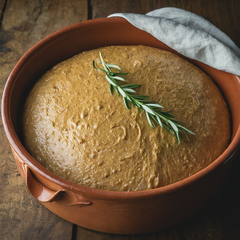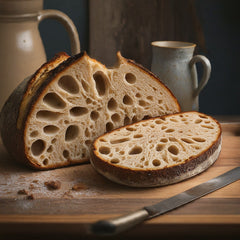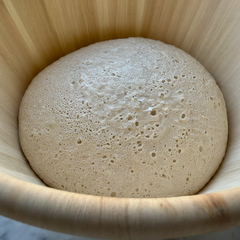For beginning home sourdough bakers, the journey to perfect loaves can feel like navigating a maze. Dense, under-flavored bread? We've all been there.
But fear not, fellow bread enthusiasts! The answer to your struggles might lie in a crucial stage often under appreciated: bulk fermentation. So, what exactly is bulk fermentation?

Bulk Fermentation is the Secret to Amazing Sourdough Bread
Simply put, bulk fermentation the period after mixing your dough when it rests and ferments in a single mass before shaping. During this magical time, yeast and bacteria work their wonders, producing the essential elements for a delicious loaf:
-
Air pockets: Carbon dioxide gas gets trapped, creating a light and airy crumb like you dream of.

- REAL™ Flavor compounds: Organic acids and other goodies develop, giving your bread its signature tang and depth of flavor. Skipping bulk fermentation means missing out on the development of those delicious flavor compounds. Your bread might be edible, but it won't sing.
- Gluten development: The dough strengthens, making it easier to handle and shape later on.
- Texture troubles: Without proper fermentation, the gluten network won't develop, leading to a dense, gummy crumb instead of a light and airy one.
- Proofing woes: An under-fermented dough needs longer proofing, which can be unpredictable and lead to over-proofing in the end.
Bulk Fermentation FAQs
Q: Why is bulk fermentation so important for sourdough?
A: It's where the dough comes alive! Fermentation creates CO2 for a light, airy crumb and amazing flavor compounds. Skipping it leads to dense, bland loaves.

Q: Bulk vs. proofing: What's the difference?
A: Bulk happens before shaping the dough, just after the first 3 stretches and folds. Proofing comes right after tensioning/shaping and before baking. Think of bulk as the main event and proofing as the final prep.
Q: What's the best temperature for bulk fermentation?
A: There's no one-size-fits-all answer! It depends on your dough and desired results. Generally, 74-76°F (23-24°C) is good for warm bulk, while colder temperatures slow things down. And a long cold ferment is just what those of us who want a stronger sourdough tang are looking for. Warm is faster and sweeter in the end and cold is slower and more tangy. Some bakers even refrigerate their dough for 3 days before baking.

Q: What container should I use?
A: Anything large enough to let your dough double or triple in size! Bowls, buckets, or even proofing baskets are popular choices. But whatever you use, be sure to cover the dough with a damp towel or plastic covering.
Q: Should I strengthen my dough during bulk?
A: Optional, but helpful! Stretches and folds build dough strength for the first hour and a half after mixing, but many bakers continue these during the first half of the bulk rise (1–4 hours of the minimum total of 8 hours). And it gives you a chance to check on dough progress.
Q: How do I know when bulk fermentation is done?
A: It's not just about rise! Crucial signs to watch for, include texture, consistency, and timing. Now, here's the catch: bulk fermentation is not just about waiting. It's a delicate dance between time, temperature, and technique. Get it wrong, and you might end up with an over proofed sticky mess or a dense, under-proofed loaf. This one is part of the art of learning how to read your dough
But don't worry! Mastering bulk fermentation isn't rocket science. With the right knowledge and a little practice, you can unlock the secrets to amazing sourdough:
- Understanding the science: Learn how temperature, hydration, and dough recipe influence fermentation times.
- Reading the signs: Observe your dough's texture, rise, and timing to know when it's perfectly fermented.
- Embracing the journey: Don't be afraid to experiment and find what works best for you and your baking environment.
Ready to transform your sourdough journey? Dive deeper into the world of bulk fermentation with detailed guides, like this one from Maurizio Leo's "The Perfect Loaf." Here and elsewhere on his blog,you'll find more helpful tips, and inspiring recipes. Soon, you'll be baking loaves that are not just edible, but truly delightful!
Remember, the path to sourdough success is paved with knowledge, practice, and a little patience. So, grab your starter, embrace the magic of bulk fermentation, and get ready to bake like a pro!


1 comment
exelente Escrito despejo muchas dudas